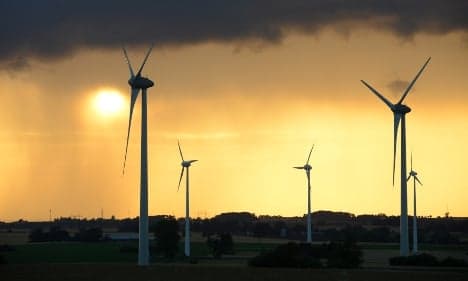Sweden slammed for ecological footprint

Sweden is among the world's top ten polluters according to one of the largest scientific studies looking at the impact of humans on earth, produced by the WWF.
Researchers measured how countries around the world consume fossil fuels and looked at other relevant factors including forestry, fishing and farming methods. Sweden came out tenth on the list, up three places from the last time the WWF released a similar study. The report suggests that if everyone in the world lived like a Swede, the global population would need the resources from 3.7 earth-like planets.
"We have a very high material consumption, while other countries have reduced their consumption a bit because of the recession," said Sweden's WWF spokesperson Carina Borgström-Hansson. "We eat quite a lot of meat and we have great cars and we import quite a lot of products from China," she added. Launched at the United Nations in Geneva, the report ranked 152 nations' ecological footprints and warned the world was living beyond its means. Oil producing countries topped the list, with Denmark - famed for its renewable energy - coming fourth. WWF argues that to reverse the trend, politicians in Sweden and globally would need to limit forestry and fossil fuel emissions and consumers would need to dramatically change their habits. "This damage is not inevitable but a consequence of the way we choose to live," Ken Norris, Director of Science at the Zoological Society of London which works with the WWF, said in a statement.

The panda is one endangered animal the WWF is worried about. Photo: TT The report also found that world populations of fish, birds, mammals, amphibians and reptiles fell overall by 52 per cent between 1970 and 2010, far faster than previously thought. "These are the living forms that constitute the fabric of the ecosystems which sustain life on Earth – and the barometer of what we are doing to our own planet, our only home. We ignore their decline at our peril," said WWF International Director General Marco Lambertini. "It is essential that we seize the opportunity – while we still can – to develop sustainably and create a future where people can live and prosper in harmony with nature," he added. The WWF's animal population index is maintained by the Zoological Society of London and has tracked more than 10,000 vertebrate species populations from 1970 onwards.
Comments
See Also
Researchers measured how countries around the world consume fossil fuels and looked at other relevant factors including forestry, fishing and farming methods.
Sweden came out tenth on the list, up three places from the last time the WWF released a similar study.
The report suggests that if everyone in the world lived like a Swede, the global population would need the resources from 3.7 earth-like planets.
"We have a very high material consumption, while other countries have reduced their consumption a bit because of the recession," said Sweden's WWF spokesperson Carina Borgström-Hansson.
"We eat quite a lot of meat and we have great cars and we import quite a lot of products from China," she added.
Launched at the United Nations in Geneva, the report ranked 152 nations' ecological footprints and warned the world was living beyond its means.
Oil producing countries topped the list, with Denmark - famed for its renewable energy - coming fourth.
WWF argues that to reverse the trend, politicians in Sweden and globally would need to limit forestry and fossil fuel emissions and consumers would need to dramatically change their habits.
"This damage is not inevitable but a consequence of the way we choose to live," Ken Norris, Director of Science at the Zoological Society of London which works with the WWF, said in a statement.

The panda is one endangered animal the WWF is worried about. Photo: TT
The report also found that world populations of fish, birds, mammals, amphibians and reptiles fell overall by 52 per cent between 1970 and 2010, far faster than previously thought.
"These are the living forms that constitute the fabric of the ecosystems which sustain life on Earth – and the barometer of what we are doing to our own planet, our only home. We ignore their decline at our peril," said WWF International Director General Marco Lambertini.
"It is essential that we seize the opportunity – while we still can – to develop sustainably and create a future where people can live and prosper in harmony with nature," he added.
The WWF's animal population index is maintained by the Zoological Society of London and has tracked more than 10,000 vertebrate species populations from 1970 onwards.
Join the conversation in our comments section below. Share your own views and experience and if you have a question or suggestion for our journalists then email us at [email protected].
Please keep comments civil, constructive and on topic – and make sure to read our terms of use before getting involved.
Please log in here to leave a comment.